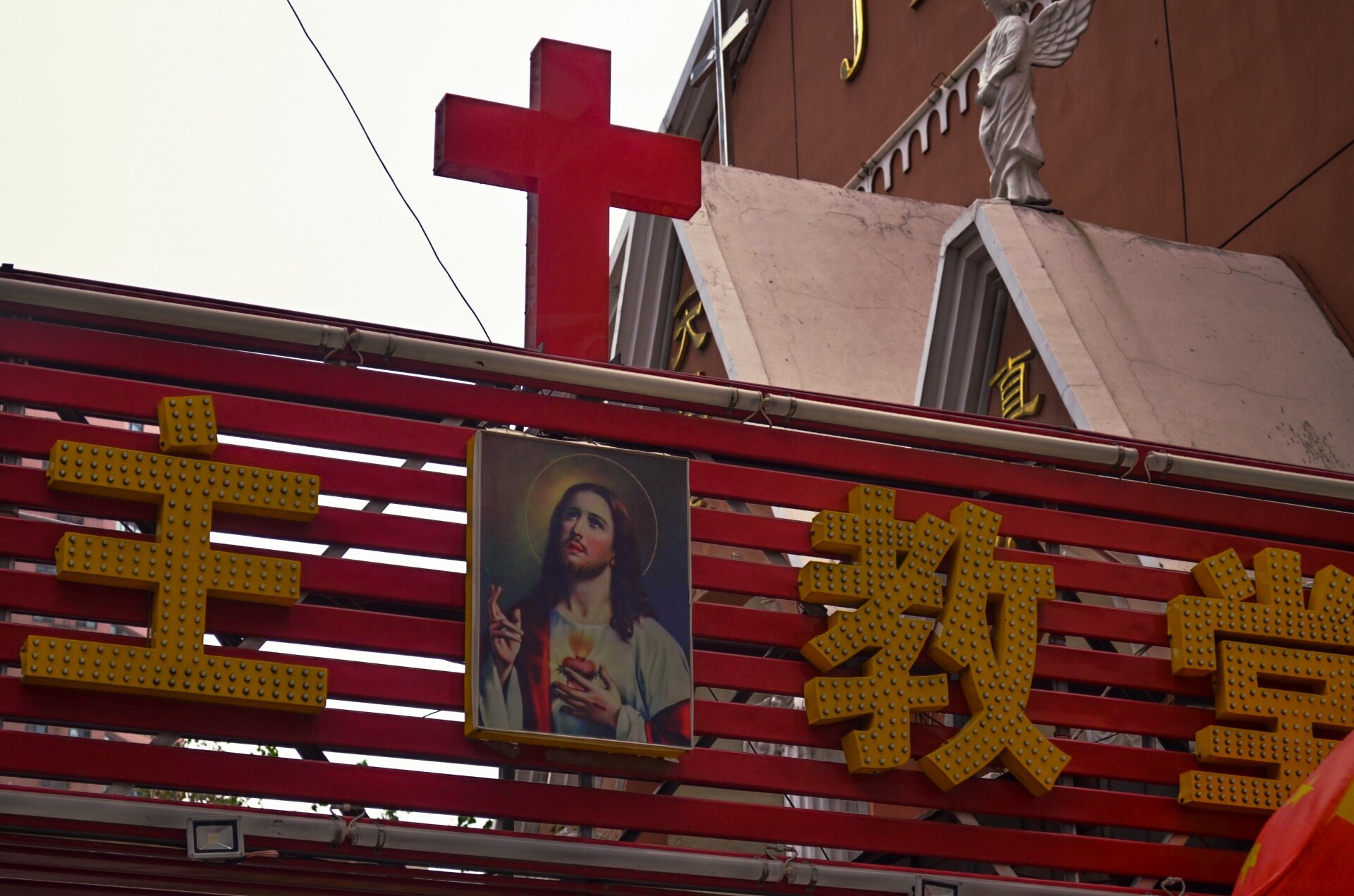Congress Probes Chinese Catholic Bishop's Assumed Death, Religious Freedom in China
A Catholic Church entrance in China. Creative Commons photo.
Bishop James Su Zhimin, the Catholic bishop of Baoding in Hubei Province, China, spent over 40 years in prison throughout the course of his life. He hasn’t been seen in 17 years, since he surfaced in a hospital in 2003. It has now been reported and is believed that Su is dead.
The Tom Lantos Human Rights Commission, a bipartisan caucus of the U.S. House of Representatives, held a panel on July 30 to discuss the imprisonment, torture and believed death of Su. Panelists included Nury Turkel, the Commissioner of the United States Commission on International Religious Freedom, Tom Farr, the President of the Religious Freedom Institute and Nina Shea, Director of the Center for Religious Freedom and the Hudson Institute, who has contributed columns to Religion Unplugged.
Su’s arrest and treatment is just one way that infringements on human rights and religious freedom have been imposed in China, panelists said.
Many of these infringements have to do with restrictions and surveillance of churches: children under 18 aren’t allowed to attend services, facial recognition cameras are required to be outside all churches and there’s a potential offering of cash rewards to those who report underground church activity. In some cases, icons of Jesus and Mary have been removed and replaced with photos of China’s President Xi Jinping.
Turkel even referenced reports which say PPE products for handling the COVID-19 crisis were made by imprisoned Uighur Muslims.
Because of infringements like these and others, which the United States government has long been aware of, China is considered to be a Country of Particular Concern (CPC) by the State Department and has been the subject of similar briefings from the Trump administration and other religious freedom organizations.
Panelists agree that these restrictions come because China is attempting to slowly control and then eradicate all outside religions—particularly Catholicism and Islam, which they say the Chinese government believes to be Western and detrimental.
The most worrying form of control, a topic which occupied a significant portion of the panel discussion, is the Chinese government’s retranslation of both the Bible and Quran. It’s believed that these translators will alter or remove passages that disagree with the Chinese Communist Party (CCP).
“Obviously, that is anything but a benign initiative,” said Rep. Christopher H. Smith, the co-chair of TLHRC. “It seems to me that this is nothing but a communist effort to further expunge holy books.”
In the early 90s, Smith says, he learned on one of several human rights that censorship efforts in China had already cut out significant portions and books of the Bible.
Why such heavy restrictions against religious groups and persecution of Christians and Muslims?
“China has no problem with Western ideology or influence,” Shea said, citing communism’s Western origins as the proof of this. “It has a problem with Christianity because it is so successful.”
These distinctions were made with the goal of discouraging the Holy See’s continued partnership with the Chinese government.
This partnership includes the Chinese Catholic Patriotic Association. When Catholics in China sign onto this agreement, they become officially recognized by the CCP, but they must practice a state-sanctioned version of Catholicism, including use of the censored Bible.
“In 1997, Bishop Su wouldn’t join the Catholic Patriotic Organization,” Smith said. “That seems to be the approximate cause for his rearrest and this decades-long incarceration.”
The Holy See encourages this per an agreement signed in 2018, with the hopes that the Catholic Church will be able to unify with the CCP—but nuns and priests continue to practice their faith underground, despite pressure from the church and threat of persecution.
Farr particularly advocated the position that the Holy See should not renew this agreement when given the chance to do so this September. He said that the unity the church hoped to achieve has not been realized, and that this is only increasing the amount of persecution Catholics face.
Turkel concluded his remarks by urging for more American involvement in this crisis of religious freedom, and urged Congress to pass the Forced Labor Prevention Act as soon as possible to continue to fight against labor enslavement, often of religious groups.
And all panelists were in agreement that the threat China poses to religious freedom is one that should be closely watched and acted against.
“I urge everyone listening to this, and certainly all American officials and officials at the Vatican, to stop underestimating what [China is] capable of,” Farr said. “They certainly know what they’re doing, so we should know what we’re doing.”
Jillian Cheney is a Poynter-Koch fellow for Religion Unplugged who loves consuming good culture and writing about it. She also reports on American Protestantism and Evangelical Christianity. You can find her on Twitter @_jilliancheney.

